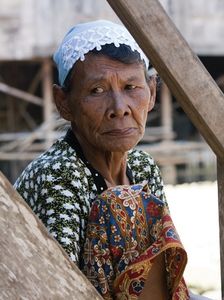 The Lintang, or as they are more commonly known, Lintang Empat Lawang, is a mixture of the Lintang and Empat Lawang people. The Lintang are also often called the Musi Ulu people. They live along the left and right forks of the Lintang River in South Sumatra province.
The Lintang, or as they are more commonly known, Lintang Empat Lawang, is a mixture of the Lintang and Empat Lawang people. The Lintang are also often called the Musi Ulu people. They live along the left and right forks of the Lintang River in South Sumatra province.
The Lintang understand the Besemah, Semende, Lematang, Kikim, and Enim dialects. They can understand Palembang Indonesian well. Some characteristic language features include the use of the words nedo, which means ‘no’ or ‘not yet’, ngapo (What is it?), and kelo (wait a minute).
What are their lives like?
The Lintang make their living from farming rice, coffee, rubber, spices, and vegetables. They also raise goats, water buffaloes, and ducks. Although they live near rivers, they do not fish for a living. Their economic level is very low. Lintang men work as seasonal farmers. For instance, coffee harvesting only occurs once a year. The women help the men work in the fields and as a result, often leave their children at home without supervision. Lintang houses are wooden on top of raised platforms. Lintang people who do not perform manual labor typically have a long pinky fingernail as a sign of higher social status.
Although Lintang youth choose their own spouses, their parents still make arrangements for the wedding. The Lintang system of kinship is patrilineal (tracing descent through the father’s line).
When conflict arises, the Lintang solve it through family discussion. If they do not reach an agreement, the problem is brought to the village leaders or elders. If that still does not work, they will bring the problem to the police or the religious court.
The only original Lintang art form is the form of martial arts that is taught in their Islamic schools. The Lintang have a traditional dance, but it is no longer practiced. Ceremonies and celebrations are normally tied to Islamic religious events, such as circumcisions, weddings, and Idul Fitri (end of the Ramadan month of fasting).
What are their beliefs?
The Lintang are a completely Islamic people group. However, even the Lintang themselves admit that many are Muslim in name only, because many still gamble, rape, and steal. The same behavior is found in people who become converts to Islam from other religions, creating an impure form of Islam.
Marriage between people of different religions is forbidden. Couples that marry must both be Muslim. If one partner is of a different religion, that person must convert to Islam. Nonetheless, the Lintang still hold some traditional beliefs such as the presence of a puyang (ancestor spirit) named Kagede in the Karang Dapo Lama village. According to their beliefs, Kagede is the child of a lady-in-waiting from the heavens. Local dukun (healers/shaman) also play a strong role within the Lintang community.
What are their needs?
The Lintang need improved medical facilities. They often suffer from diseases like malaria, typhoid, skin diseases, diarrhea, and respiratory infections due to unsanitary conditions. The infant mortality rate is also very high. In the area of education, they need many more teachers. Finally, the agricultural sector needs to be improved.
Leave a Reply